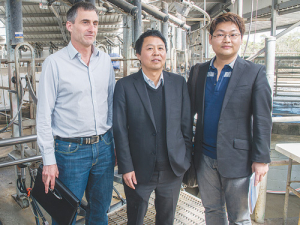Birth woes
OPINION: What does the birth rate in China have to do with stock trading? Just ask a2 Milk Company.
 VDL Farms chief executive David Beca, Moon Lake Chairman Mr Lu Xianfeng and Moon Lake Managing Director Sean Shwe during a farm visit earlier this year.
VDL Farms chief executive David Beca, Moon Lake Chairman Mr Lu Xianfeng and Moon Lake Managing Director Sean Shwe during a farm visit earlier this year.
Tasmania will send fresh milk to China from early next year.
The Chinese owner of the Van Diemen’s Land dairy properties (VDL Farms) will export brand ‘Van Milk’.
VDL Farms was owned by New Plymouth District Council until March this year, then sold to Chinese businessman Lu Xianfeng’s Moon Lake Investments.
Moon Lake managing director Sean Shwe recently unveiled the Van brand and details of the company’s plans to fly fresh milk direct from Hobart Airport to Ningbo in China.
Three shipments of Van Milk have been sent to China in the past three months for testing, as ruled for export products to the country. Now regular shipments can begin from this, Australia’s biggest dairy property, on Tasmania’s far north-west coast. It has the cleanest air in the world, Moon Lake says.
The company is negotiating with several airlines and airports to initially fly weekly from Hobart to Ningbo, starting in the first quarter of 2017. It hopes to increase the frequency to two-three times per week in 12 months.
This will open Tasmania’s first regular international air freight route to Asia.
“This is an exciting venture for our company and potentially for all Tasmanian producers of fresh, perishable produce such as seafood, fruit and vegetables,” says Shwe.
About 10 million litres of milk – 10% of VDL’s annual milk production – will be processed under contract by Lion Dairy in Hobart, Tasmania’s only licensed export pasteurised milk processor with the scale Moon Lake requires.
VAN has been set up as a sister company to Moon Lake to market dairy products, initially fresh milk in 1L and 600ml cartons. There are plans to include yogurt and other products for the Chinese market.
Moon Lake has engaged two freight logistics companies – SRT Logistics (cold freight and storage in Tasmania) and national firm Link Logistics (quality control of the milk during flights to China) to guarantee “chain of custody” and quality of the milk from the cow to the carton to the consumer.
This will get VAN Milk status as a high value product in China.
“We’ve chosen Beijing and Ningbo for initial marketing because Ningbo is Mr Lu’s hometown and he has established networks to sell the product. Also, the city has among China’s highest average incomes and is less saturated with western products than, say, Shanghai.
“Even before we have started commercial shipments we have forward sold 15 million yuan of Van Milk,” Shwe says.
“There will be a sophisticated marketing campaign where buyers of Van Milk will have an opportunity to win a visit to Tasmania and see where the milk comes from,” says Shwe.
Agrisea NZ has appointed Craig Hudson as it's new chief growth officer.
State farmer Landcorp, trading as Pamu, is a forecasting a full-year net profit of around $100 million.
Tony Aitken, chief executive of Ruralco, has been awarded the Excellence in Business Leadership Award at the ANZ Business of the Year Awards.
Global trade has been thrown into another bout of uncertainty following the overnight ruling by US Supreme Court, striking down President Donald Trump's decision to impose additional tariffs on trading partners.
Controls on the movement of fruit and vegetables in the Auckland suburb of Mt Roskill have been lifted.
Fonterra farmer shareholders and unit holders are in line for another payment in April.
OPINION: Staying with politics, with less than nine months to go before the general elections, there’s confusion in the Labour…
OPINION: Winston Peters' tirade against the free trade deal stitched with India may not be all political posturing by the…